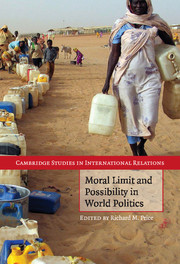Book contents
- Frontmatter
- Contents
- List of contributors
- Preface
- 1 Moral limit and possibility in world politics
- 2 Constructivism and the structure of ethical reasoning
- 3 The role of consequences, comparison and counterfactuals in constructivist ethical thought
- 4 Sovereignty, recognition and indigenous peoples
- 5 Policy hypocrisy or political compromise? Assessing the morality of US policy toward undocumented migrants
- 6 Lie to me: sanctions on Iraq, moral argument and the international politics of hypocrisy
- 7 Paradoxes in humanitarian intervention
- 8 Inevitable inequalities? Approaching gender equality and multiculturalism
- 9 Interstate community-building and the identity/difference predicament
- 10 Progress with a price
- Index
- Cambridge Studies in International Relations
- References
9 - Interstate community-building and the identity/difference predicament
Published online by Cambridge University Press: 14 May 2010
- Frontmatter
- Contents
- List of contributors
- Preface
- 1 Moral limit and possibility in world politics
- 2 Constructivism and the structure of ethical reasoning
- 3 The role of consequences, comparison and counterfactuals in constructivist ethical thought
- 4 Sovereignty, recognition and indigenous peoples
- 5 Policy hypocrisy or political compromise? Assessing the morality of US policy toward undocumented migrants
- 6 Lie to me: sanctions on Iraq, moral argument and the international politics of hypocrisy
- 7 Paradoxes in humanitarian intervention
- 8 Inevitable inequalities? Approaching gender equality and multiculturalism
- 9 Interstate community-building and the identity/difference predicament
- 10 Progress with a price
- Index
- Cambridge Studies in International Relations
- References
Summary
What do constructivist theory and the experiences of international institutions tell us about what kinds of community to build and how to build communities in international relations? Recently, the constructivist scholarship in international relations (IR) has invested a significant deal of theoretical and empirical attention in security communities and processes of interstate community-building. The very fact that certain states have transcended the realist world of power politics to conduct their relations on the basis of mutual trust and identification has been taken as solid evidence that progress is possible in international relations. In normative terms, interstate community-building has been considered a positive development in two respects. First of all, it has been widely believed that community relations based on mutual trust and identification consolidate a condition of stable peace, where states come to neither expect nor prepare for war against each other. Secondly, interstate communities in the context of membered institutions serve as fruitful grounds for the consolidation and outward diffusion of international norms, specifically through the imposition of membership conditionality. Constructivist scholars have pointed to various examples of interstate communities, both within and outside the context of membered international institutions, such as the European Union (EU), the Association of South East Asian Nations (ASEAN), the Organisation for Security and Cooperation in Europe, the US–Canadian relationship, the US–Israeli relationship and the group of democratic states writ large.
- Type
- Chapter
- Information
- Moral Limit and Possibility in World Politics , pp. 253 - 280Publisher: Cambridge University PressPrint publication year: 2008
References
- 2
- Cited by



